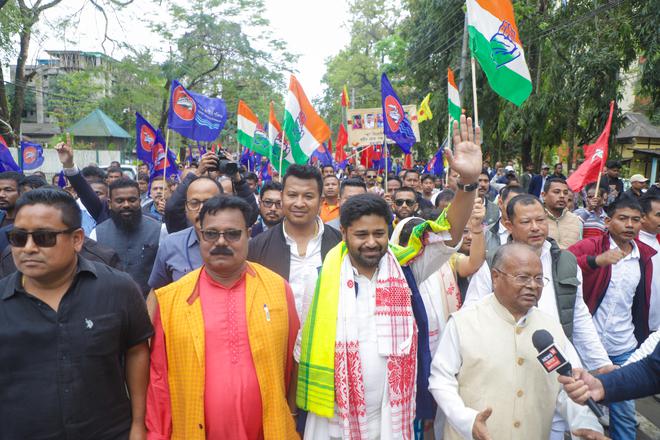The electoral combat in Dibrugarh, the easternmost of Assam’s 14 Lok Sabha constituencies, is between crusaders against contrasting laws involving migrants or refugees from Bangladesh.
BJP heavyweight and Union Minister Sarbananda Sonowal, 61, has a few things in common with his main rival, the 44-year-old Lurinjyoti Gogoi of the Assam Jatiya Parishad (AJP) in Dibrugarh. They were leaders of the All Assam Students’ Union, the launch pad for many an aspiring politician in Assam and they rose to prominence handling the “Bangladeshi” issue, an electoral staple.
Mr. Sonowal fought a legal battle in the Supreme Court to have the Illegal Migrants (Determination by Tribunals) Act scrapped in 2005 while Mr. Gogoi floated his party primarily to safeguard the interests of the indigenous people by resisting the Citizenship (Amendment) Act of 2019.
The IM(DT) Act, associated mostly with Bengali Muslims, was said to be loaded in favour of people with doubtful nationality. The CAA, allowing faster citizenship for non-Muslims from India’s neighbourhood, is perceived to pave the way for Hindus from Bangladesh to settle down in Assam.
The framing of the rules for the CAA ahead of the election has now given Mr. Gogoi and the AJP – one of 16 parties in the Congress-led United Opposition Forum, Assam – the ammunition to fire salvos at the BJP.
“However much the BJP defends this unconstitutional Act, the people of Assam know it will spell doom for them. The CAA is a major issue for us, and we are telling them how their jatiya nayak [national hero, a sobriquet Mr. Sonowal had earned after his legal victory] has turned into a jatiya khalnayak [national villain],” Jagadish Bhuyan, the general secretary of AJP and a former BJP leader told The Hindu.
The AJP has also been highlighting how the BJP has “betrayed” the aspirations of six communities who have been demanding Scheduled Tribe (ST) status for decades. The Adivasis or tea plantation workers form the largest chunk of voters among these communities followed by the Ahoms, Morans, Mataks, and Chutias.

The Adivasis are largely believed to have gravitated from Congress towards the BJP over the years. The BJP is banking on them for Mr. Sonowal, who replaced Cabinet colleague and Adivasi leader Rameswar Teli, to register a hat-trick of wins for the party in Dibrugarh.
“The BJP believes in taking all communities together and people know we stand for development. One has to realise the CAA is a Central rule for a humanitarian cause while the IM(DT) was imposed specifically on Assam,” Mr. Sonowal said.
The BJP, however, is wary of the damage Manoj Dhanowar, the Aam Aadmi Party (AAP) candidate can cause. An Adivasi leader and son of former Assam Speaker Rameswar Dhanowar, the AAP candidate has been working primarily among the plantation workers.
But Mr. Sonowal is hopeful of the people welcoming him back in Dibrugarh. He won his maiden Lok Sabha election from Dibrugarh as an Asom Gana Parishad (AGP) candidate in 2004 but lost the seat in 2009. He joined the BJP in 2011 and won the adjoining Lakhimpur seat for the party in 2014.
He resigned from Parliament after becoming the Chief Minister to head Assam’s BJP-led government in 2016. After handing over the reins of the State to Himanta Biswa Sarma, he became a Rajya Sabha member.
The AAP defied the Opposition alliance’s understanding to field Mr. Dhanowar from Dibrugarh. But the contest is expected to be between Mr. Sonowal and Mr. Gogoi, whose critics point out that he could not capitalise on the anti-CAA sentiments to win any of the two Assembly seats – Duliajan and Naharkatia – he contested in 2021.
Duliajan and Naharkatia are two of the 10 Assembly segments of the Dibrugarh Lok Sabha constituency, which goes to the polls on April 19.







